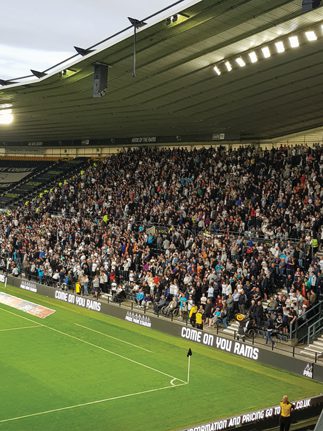The November print edition of Professional Security Magazine has a page on the latest Home Office figures about football banning orders and arrests. It’s the latest of numerous pages about resurgent trouble at grounds, notably the siege of Wembley for about 12 hours before, during and after the Euro 2021 championship final when Italy beat England on penalties.
As this year’s and previous Home Office statistics show, relatively worse hooliganism happens down the football pyramid. While Premier League clubs’ security focus may routinely be on away supporters, in the lower leagues, it’s the clubs’ own fans, or to be precise the most fanatical ones, the ‘ultras’.
In the fifth tier, Wrexham fans recently caused trouble on the street at Oldham. Another fixture with next to no history, Derby County FC versus Plymouth in the third tier, led to arrests. In a second tier match between Lancashire rivals Blackpool FC and Blackburn Rovers FC, missiles were thrown. Lancashire Police later released CCTV stills of fans from both clubs that they wanted identifying; the quality of images was, at best, mixed.
It’s unfair to single out Blackpool FC, although the Championship is arguably the worst example of a division that finds plenty of money for wages and transfer fees – relatively lots compared with the top leagues on the Continent – yet seems forever unable to go beyond what is mandated as absolutely necessary for ground safety, which includes video surveillance. Not that the proverbial wallets are any more open in the fabulously wealthy Premier League.
One security supplier recalls going to one Premier League ground, in hope of landing a contract. Each time they passed the same high-end car (was it a Ferrari, a Lamborghini?) parked in the same place. He got to asking, what was the story behind it? It belonged to a player who had gone on the team coach, and had not collected it; and there it stayed, evidently surplus to his requirements. The supplier reflected that by selling the vehicle (although the player may have got it for free to promote the brand?) the club could have afforded the contract that the supplier was hoping for.
Even in the Premier League, suppliers of services generally find it hard to get sign-off. Any such signing has to go up the management chain to the owner; and if they have got out of bed the wrong side that morning, or if their shares have gone down lately, the owner may refuse to sign.
There are two big gaps in English football, and have been since the Premier League established itself; between the Premier League and the rest, and between the playing side, where players may unremarkably have six-figure a week earnings, and the facilities side that includes stewarding and security, which rests on zero hours, minimum wage or slightly above stewards, cleaners, bar staff, waiting staff and the like.
It’s far from unusual, a dozen years or more after IP networked video surveillance came in, to find a professional club still using analogue-era cameras, transmitting video over coax cable to digital video recorders. That might also be true of hospitals; but they don’t enjoy billion-pound television contracts. Even quite modern stadiums renovated as a result of the reforms after Hillsborough are without the most modern network infrastructure. The largest capital spend, then, may be for that backbone, rather than for the video cameras hooked onto it, which are merely one sort of device attached to a network; and in any case the user may budget for replacing a few analogue cameras with digital ones at a time.
Each ground’s SAG (safety advisory group) made up of the police and local government officers and the like can require new cameras or other improvements, or else refuse the ground a licence. Or, a SAG can order that a stand must close, due to poor CCTV (or some other shortcoming in the fabric). But it’s a brave member of a SAG, and one that knows where they stand, to make any such demand, because that will deprive a club of income, or of the ability to play at all (and bring in income to fund improvements, a club could argue). In any case, if a stand was shut because of poor quality CCTV, a club could get around that by hiring stewards. Though stewards have become hard to source and retain; a survey by the trade body the UK Crowd Management Association found that many of its members routinely might over-book by 10, 20 or 30 per cent so as to be reasonably sure that they would 100 per cent meet a stewarding requirement.
Why the difficulty in hiring stewards, typically only needed on a Saturday afternoon and a midweek evening, to supplement earnings including as a doorman? As with the hospitality and service sectors more generally, the reasons may be numerous: Brexit, covid lockdowns that meant sport needed drastically fewer stewards no matter how soon professional sports restarted after the spring 2020 lockdown; even the Manchester Arena Inquiry forensic examination of teenage stewards, which made alternatives (in the dry and warm, without screaming, drunken and ungrateful spectators) such as shop and cafe work seem more attractive, if anything for better hourly rates.
The soaring rise in the cost of electricity has meant that lower league clubs are querying if a referee really has to insist on having floodlights switched on so soon, or at all, given that pitch lighting is a four-figure sum. Why could not Premier League clubs adopt local lower league clubs and aid them so that they can afford new CCTV?










